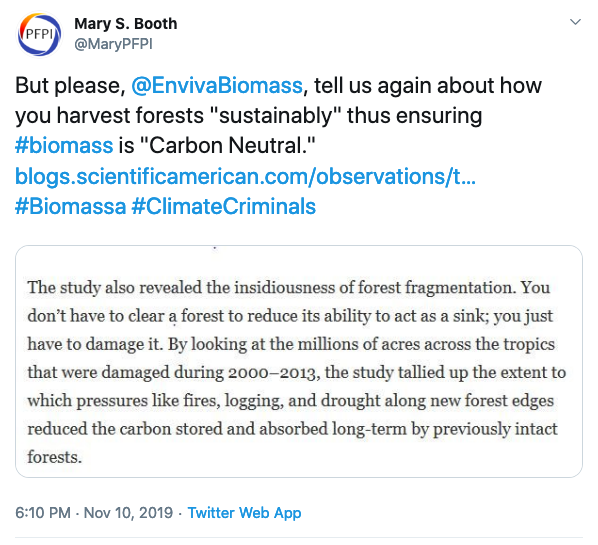When extreme anti-forestry and anti-biomass activists resort to pushing obvious misinformation and deception, it’s a sign that they’re losing the public argument and lack the support of the scientific community.
That’s exactly what’s happened with the latest social media screed from the Partnership for Policy Integrity (PFPI).
PFPI has now been caught misleading the public by pointing to a study related to deforestation in South America as supposed evidence against wood biomass sourced from the US South. PFPI questioned the carbon reduction merits of renewable wood energy by linking to a study from Science Advances.

The problem? That study has absolutely nothing to do with biomass. The study concerns tropical forest deforestation in Latin America, Central Africa, and the Asia-Pacific, which are not – and never have been – sourcing regions for the US wood biomass industry.
PFPI – which includes the word “integrity” in its name – is surely aware of this fact. Its conflation of forests in South America with the growing forest landscape in the US South is a willful attempt to confuse the public.
Deforestation in South America is a tragedy, and we should call attention to it. But it has absolutely nothing to do with biomass sourced from the US South.
That’s even more true since the biomass industry has had the opposite impact in the US South – where the forest landscape is growing, not shrinking. That’s because markets created by the renewable wood energy industry incentivize landowners to plant more trees and discourages them from devoting their land to agriculture or development, which would permanently reduce forest acreage.
Today, private landowners in the US Southeast grow 40% more wood than they remove every year. To see the benefits of the forest products industry, one only needs to look to North Carolina, where much of the United States’ biomass is sourced from. In contrast to claims that biomass causes deforestation, forest acreage in North Carolina has actually grown in recent years. According to data from the USDA’s Forest Inventory and Analysis Service, North Carolina has gained over 150,000 acres of forest land since 2013.
The notion that biomass grows forests is supported by research from experts at the University of Georgia and the US Forest Service, which found that nationwide, the absence of demand for wood biomass could actually result in deforestation up to 15,000 square kilometers (5,791 square miles), roughly the size of the entire state of Connecticut. Conversely, increased demand for wood pellets retains thousands more square kilometers in natural timberland area.
Renewable wood biomass energy is a key recommendation of leading scientists and the United Nations Intergovernmental Panel on Climate Change to reduce carbon emissions. It’s time for extreme anti-forestry activists like PFPI to recognize this fact and quit spreading misinformation about a technology that is actively displacing fossil fuels.

